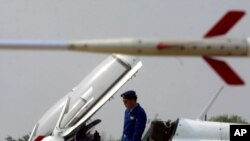China says it hopes the international community will "better understand" its armed forces, with the release of a biennial report on developments with its military. It also reaches out to Taiwan and the United States.
Defense Ministry spokesman Geng Yansheng says China is seeking to build confidence with the release of its latest military white paper.
Geng says the report should help the international community better understand China’s armed forces and advance trust and cooperation between China and the rest of the world.
The report says China will continue to maintain a defensive military policy and that the country will focus on its own economic development.
Those should be welcome words to some of China's neighbors, who have become concerned by Beijing's increasingly assertive claims to sovereignty in the seas around its shores. But the report also says China's navy has developed an offshore defense strategy with the capability of conducting operations "in distant waters." It says one of the jobs of China's military is to safeguard the country's maritime rights and interests.
The report specifically criticizes the United States for selling weapons to Taiwan, a separately-governed island that China considers part of its territory.
The spokesman did not mention Taiwan, specifically, but said China is ready to work with the United States to, in his words, "properly address" issues related to the core interests of the two countries.
Geng indicated that China is ready to talk to Taiwan authorities and is planning cross-Straits military exchanges.
He says China wants to avoid a scenario where "blood brothers of the Chinese nation" meet on the battlefield or engage in armed conflict against each other.
In Taipei, Arthur Ding, of the Chinese Council of Advanced Policy Studies, says despite Beijing’s soothing words, many Taiwan residents see China’s military expansion as a threat.
"It is pretty hard to persuade the people in Taiwan and say that China is a benevolent power, but [at the same time] they have very capable, mighty military capability. I think it’s pretty hard," Ding said.
China has hundreds of missiles aimed at the island. Ding says many people in Taiwan would like to see those missiles withdrawn immediately.
The Chinese spokesman says any military deployment by the mainland is not targeted at what he terms Taiwan compatriots” He says the issue can be discussed when the two sides set up military confidence-building measures.
Meanwhile, Geng says China and the United States still face difficulties and challenges in developing military relations. But he stresses that China will make unremitting efforts toward the building of a sound Sino-American military relationship.
He announced that the chief of general staff of the People’s Liberation Army, General Chen Bingde, will visit the United States in May. This follows a visit to China in January by U.S. Defense Secretary Robert Gates.




